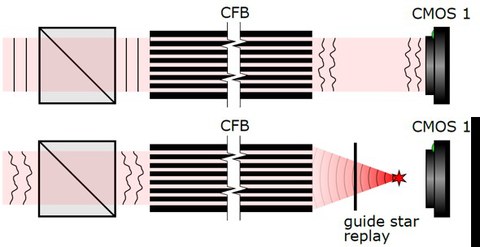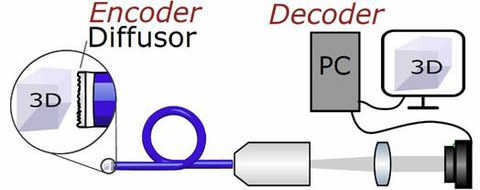Adaptive computational endoscopic systems
Existing microendoscopic systems are limited in the minimal diameter and to 2D imaging. Novel lensless 3D endoscopes with diameters below 500 µm are being investigated, realized together with partners from industry and applied with research partners at MST for instance in Optogenetics and tumor diagnostics. The systems are based on holography for self-calibration, adaptive optics, fs-Lasers, speckle correlation techniques and digital signal processing based on deep learning.
Coherent fiber bundles exhibit complex phase distortions. Thus, they are used for intensity transfer only. Together with distal lens systems they enable 2D imaging. By calibrating the optical transfer function in vivo the phase becomes available as well. This enables using the CFB as a remote phased array without distal optics for instance for 3D raster scanning microscopy.
As an alternative approach diffuse scattering can be used to code 3D object information in a 2D speckle pattern, which can be transferred through the CFB without distortions. The 3D information can then be retrieved by digital signal processing for instance using speckle correlation techniques or deep learning for single-shot 3D measurements.
In this field we have the following projects:
Investigation of laser systems for 3D endomicroscopy using coherent fiber bundles
Minimally invasive 3D imaging using a diffuser and deep learning
Needle sized lensless holographic endoscope
In vivo brain tumor diagnostics by adaptive computational lensless fiber endoscopy


